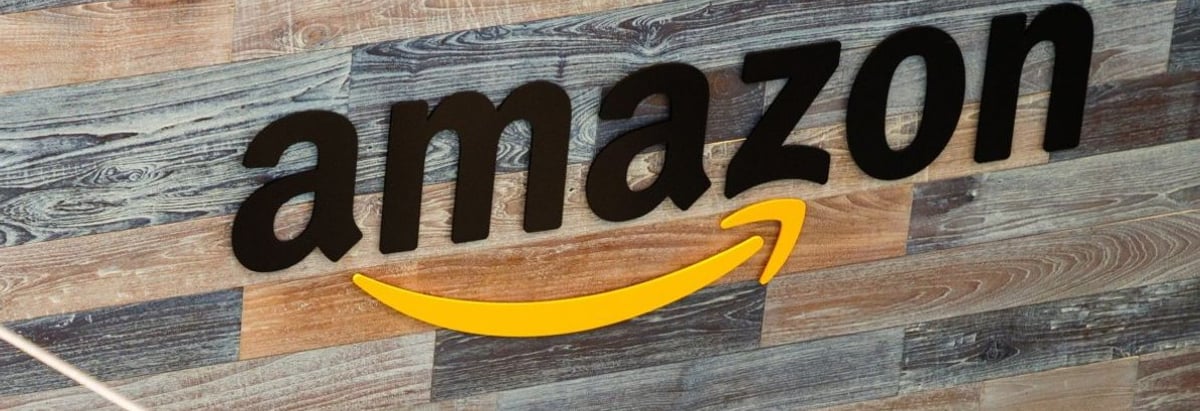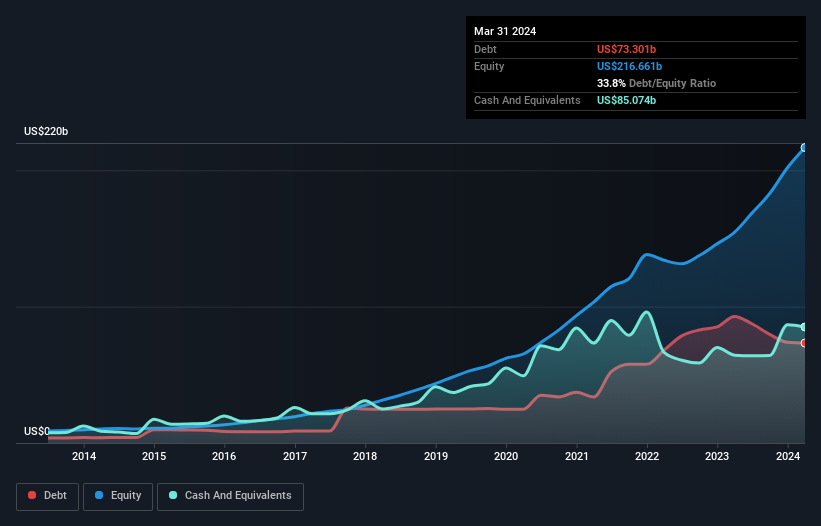Stock Analysis
- United States
- /
- General Merchandise and Department Stores
- /
- NasdaqGS:AMZN
Does Amazon.com (NASDAQ:AMZN) Have A Healthy Balance Sheet?

Legendary fund manager Li Lu (who Charlie Munger backed) once said, 'The biggest investment risk is not the volatility of prices, but whether you will suffer a permanent loss of capital.' When we think about how risky a company is, we always like to look at its use of debt, since debt overload can lead to ruin. As with many other companies Amazon.com, Inc. (NASDAQ:AMZN) makes use of debt. But the more important question is: how much risk is that debt creating?
When Is Debt Dangerous?
Debt assists a business until the business has trouble paying it off, either with new capital or with free cash flow. If things get really bad, the lenders can take control of the business. However, a more frequent (but still costly) occurrence is where a company must issue shares at bargain-basement prices, permanently diluting shareholders, just to shore up its balance sheet. Of course, debt can be an important tool in businesses, particularly capital heavy businesses. The first step when considering a company's debt levels is to consider its cash and debt together.
See our latest analysis for Amazon.com
What Is Amazon.com's Net Debt?
As you can see below, Amazon.com had US$73.3b of debt at March 2024, down from US$92.9b a year prior. However, it does have US$85.1b in cash offsetting this, leading to net cash of US$11.8b.

How Strong Is Amazon.com's Balance Sheet?
Zooming in on the latest balance sheet data, we can see that Amazon.com had liabilities of US$153.0b due within 12 months and liabilities of US$161.3b due beyond that. Offsetting this, it had US$85.1b in cash and US$41.7b in receivables that were due within 12 months. So its liabilities total US$187.5b more than the combination of its cash and short-term receivables.
Of course, Amazon.com has a titanic market capitalization of US$1.91t, so these liabilities are probably manageable. But there are sufficient liabilities that we would certainly recommend shareholders continue to monitor the balance sheet, going forward. While it does have liabilities worth noting, Amazon.com also has more cash than debt, so we're pretty confident it can manage its debt safely.
Even more impressive was the fact that Amazon.com grew its EBIT by 232% over twelve months. That boost will make it even easier to pay down debt going forward. The balance sheet is clearly the area to focus on when you are analysing debt. But it is future earnings, more than anything, that will determine Amazon.com's ability to maintain a healthy balance sheet going forward. So if you want to see what the professionals think, you might find this free report on analyst profit forecasts to be interesting.
Finally, a company can only pay off debt with cold hard cash, not accounting profits. While Amazon.com has net cash on its balance sheet, it's still worth taking a look at its ability to convert earnings before interest and tax (EBIT) to free cash flow, to help us understand how quickly it is building (or eroding) that cash balance. In the last three years, Amazon.com created free cash flow amounting to 15% of its EBIT, an uninspiring performance. For us, cash conversion that low sparks a little paranoia about is ability to extinguish debt.
Summing Up
While it is always sensible to look at a company's total liabilities, it is very reassuring that Amazon.com has US$11.8b in net cash. And it impressed us with its EBIT growth of 232% over the last year. So we don't have any problem with Amazon.com's use of debt. Above most other metrics, we think its important to track how fast earnings per share is growing, if at all. If you've also come to that realization, you're in luck, because today you can view this interactive graph of Amazon.com's earnings per share history for free.
At the end of the day, it's often better to focus on companies that are free from net debt. You can access our special list of such companies (all with a track record of profit growth). It's free.
Valuation is complex, but we're helping make it simple.
Find out whether Amazon.com is potentially over or undervalued by checking out our comprehensive analysis, which includes fair value estimates, risks and warnings, dividends, insider transactions and financial health.
View the Free AnalysisHave feedback on this article? Concerned about the content? Get in touch with us directly. Alternatively, email editorial-team (at) simplywallst.com.
This article by Simply Wall St is general in nature. We provide commentary based on historical data and analyst forecasts only using an unbiased methodology and our articles are not intended to be financial advice. It does not constitute a recommendation to buy or sell any stock, and does not take account of your objectives, or your financial situation. We aim to bring you long-term focused analysis driven by fundamental data. Note that our analysis may not factor in the latest price-sensitive company announcements or qualitative material. Simply Wall St has no position in any stocks mentioned.
About NasdaqGS:AMZN
Amazon.com
Engages in the retail sale of consumer products, advertising, and subscriptions service through online and physical stores in North America and internationally.
Flawless balance sheet with solid track record.

